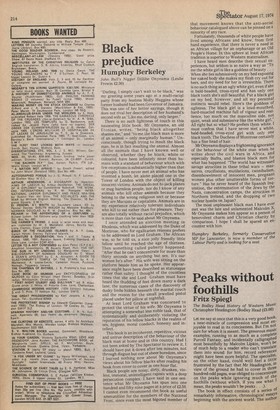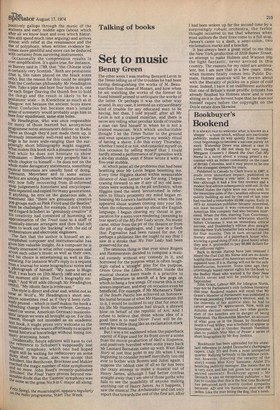Peaks without foothills
Fritz Spiegl
The Bodley Head History of Western Music Christopher Headington (Bodley Head (£5.00)
Let me say at once that this is a very good book, a near-miracle of compression and most enjoyable to read in its conciseness. But I'm not sure for whom it is meant. The generous music examples, running to as much as a complete Purcell Fantasy, and incidentally calligraphed most beautifully by Malcolm Lipkin, won't be of much help to a reader who can't translate them into sound: for him, record references might have been more helpful. The specialist, on the other hand, could well feel a little frustrated by the fact that Mr Headington, in view of the ground he had to cover in three hundred-odd pages, was obliged to concentrate on the peaks while ignoring much of the foothills (without which, if you see what I mean, the peaks wouldn't be peaks. . .).
The book in effect consists of a series of remarkably informative, chronological essaYs beginning with the ancient world. The author Positively gallops through the music of the ancients and early middle ages (about which after all we know least and over which historians still spend much time arguing) and arrives almost with relief at the renaissance and the rise of polyphony, when written evidence becomes more plentiful and more can be deduced With certainty from surviving instruments.
Occasionally the .compression results in Over-simplification. It's quite true, for instance, aS Burney said in 1789, that "the Chinese scale is certainly very Scottish." Both are pentatonic (that is, like tunes played on the black notes only). But the reason for this could be simpler than the Confucian philosophy Mr Headington cites. Take a pipe and bore four holes in it, one for each finger (leaving the thumb free to hold the thing) and the result is likely to be a Pentatonic scale — in Kweichow as much as in Glasgow: not because the ancient Scots knew about Confucius but because man's innate sense of symmetry would probably urge him to bore four equidistant, same-size holes.
Mr Headington, v,rho was once responsible for many of those learned but anonymous programme notes announcers deliver on Radio Three as though they'd just made them up, is obviously immensely well-read and his knowledge is far more wide-ranging than the surprisingly short bibliography might suggest. What makes this book such a pleasure to read is that while he does not hesitate to show enthusiasm — Beethoven very properly has a Whole chapter to himself — he does not on the Whole make derogatory statements, something musical historians are usually fond of doing. Telemann, Meyerbeer and to some extent Berlioz are among those whose reputations are only now fully recovering from ill-informed soap judgements historians and encyclopaedists repeated and copied for many generations. If anything, he errs on the generous side, A statement like "there are genuinely creative Pop groups such as Pink Floyd and the Beatles" Must be challenged, for example. I don't think
e'd regard Schubert as "genuinely creative" if his creativity had consisted of humming an approximation of the Trout tune to a staff of Musically-literate arrangers and then had left them to work out the 'backing' with the aid of orchestrators and electronic engineers. The fact that the author is himself an accomplished composer and instrumentalist has given him valuable insight. As a composer he is clearly interested in what other composers said about each other's music as well as their own, ar,d his choice is entertaining as well as illuMinating. For instance Wolf's reply to a request fram a iournal for some biographical notes and ..Photograph of himself. "My name is Hugo wolf. I was born on 13th March 1860 and am at this moment still alive. That's biography en()ugh." And Wolf adds (though Mr Headington "My idiotic face is irrelevant." The style is direct and clear and, whilst not as 4.Lerse as Wolf's, Mr Headington's short sen;ences sometimes read as if they'd been ruth`,IY pruned — which in itself makes the book a 113'elTeshing change from the verbose, German secl (or worse, American-German) musicolo7'5ts' jargon we were all brought up on. For this eason, though not intended as an academic text book, it might prove very welcome to the Music student who wants effortlessly to acquire sound historical knowledge without losing too l'Oally Practising hours. Incidentally, future editions will have to cut ,the reference to Schubert's supposedly lost (..i.a stein' symphony, which one had hoped 'Tight still be waiting for rediscovery on some `,.-1,11stY shelf. We must, alas, now accept that ochubert, like Beethoven, Bruckner and Mahler raeached the magic number of nine symphonies snd no more. John Reed's recently-published chubert: the Final Years proves beyond reanable doubt that the `Gastein' symphony was me same as the great No.9 in C major all along.
Fritz Spiegi, the musicologist, appears regularly ort the radio programme, Start The Week.



































 Previous page
Previous page